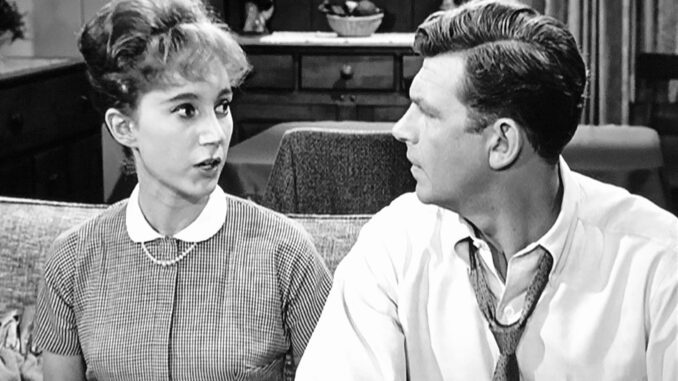
The Calculated Chaos of a Blind Date: Deconstructing the Humor in a Classic Andy Griffith Show Scene
The Andy Griffith Show, a cornerstone of American television, built its enduring appeal on homespun charm, gentle wisdom, and the quirky inhabitants of the fictional Mayberry. While often lauded for its wholesome portrayal of small-town life, the show also possessed a sharp understanding of human nature, expertly utilizing comedic situations to reveal universal truths about relationships, expectations, and the awkward dance of social interaction. The 1963 episode featuring Andy's ill-fated blind date with Karen Moore, particularly the scene where they finally meet, provides a masterclass in comedic timing, character-driven humor, and the sheer delightful chaos that can erupt when carefully laid plans go hilariously awry.
The scene opens with an air of anticipation, palpable even through the grainy black and white image. Andy, a seasoned sheriff with a knack for handling everything from moonshiners to mischievous children, stands stiffly in his living room, a picture of nervous formality. His suit, seemingly untouched since his last formal affair, adds to the sense of unease. The room itself, usually a comfortable haven of rocking chairs and checkers, feels staged, unnaturally tidy. This carefully curated setting, a facade intended to impress, immediately sets the stage for comedic deconstruction.
Enter Barney Fife, the epitome of well-meaning incompetence, orchestrating the blind date with an overzealous enthusiasm that borders on theatrical. Barney, convinced he's playing Cupid, hovers around Andy like a frantic stage manager, whispering last-minute instructions and adjusting his tie with the nervous energy of a terrier. He's convinced he's the key to Andy's romantic success, a belief that fuels the scene's comedic engine. Barney's pronouncements, delivered with unwavering confidence, are consistently undercut by his own ineptitude, creating a constant tension between intention and execution. “Remember, Andy,” he whispers, "compliment her dress, ask her about her hobbies, and for heaven's sake, don’t talk about catching chickens!" This absurd instruction, a veiled reference to a previous, less-than-successful date, highlights Barney's skewed perception of romance and his comical fear of embarrassment.
The entrance of Karen Moore, played with effortless grace by Joanna Moore, is the catalyst for the scene’s true comedic explosion. She is charming and poised, her arrival momentarily calming the frantic energy in the room. However, the initial pleasantries are short-lived. Barney, unable to resist the urge to "help," inserts himself into the conversation with an awkward eagerness, steering the conversation with clumsy interventions and injecting himself into the space between Andy and Karen like an overexcited wedge. His attempts to be helpful, such as offering a tray of oversized, homemade cookies that crumble at the slightest touch, only serve to amplify the awkwardness.
The humor in the scene lies not just in the overt gags, but in the subtle character interactions. Andy, usually the calm and collected center of the show, is noticeably flustered, his attempts to maintain a semblance of normalcy thwarted by Barney's constant interference. Karen, while initially polite, subtly registers her growing exasperation with Barney's antics, her forced smiles hinting at the mounting frustration beneath. The comedic tension builds as the trio navigate the minefield of polite conversation, each word carefully chosen and strategically deployed to avoid further embarrassment.
The climax of the scene arrives with Barney's ill-fated attempt to demonstrate his dancing skills. His rendition of the Charleston, a chaotic flurry of limbs and misplaced enthusiasm, is a visual representation of the episode's central theme: the disconnect between intention and execution. The dance, a supposed gesture of charm, becomes a spectacle of awkwardness, culminating in a spilled punch and a ruined evening dress. This moment of unadulterated chaos is both hilarious and relatable, capturing the universal experience of a social situation spiraling out of control.
Ultimately, the "Blind Date" scene from the Andy Griffith Show succeeds because it understands the inherent comedy in the complexities of human interaction. It's a scene that transcends its era, resonating with audiences even today because it speaks to the awkwardness of first encounters, the well-meaning but often misguided efforts of friends, and the sheer unpredictable nature of social situations. By expertly blending character-driven humor, perfectly timed gags, and a touch of heartwarming chaos, the scene solidifies the Andy Griffith Show's enduring legacy as a master of comedic storytelling. It's a reminder that sometimes, the best comedy arises not from grand gestures or elaborate plots, but from the simple, relatable awkwardness of everyday life, especially when fueled by the well-meaning incompetence of a character like Barney Fife.
